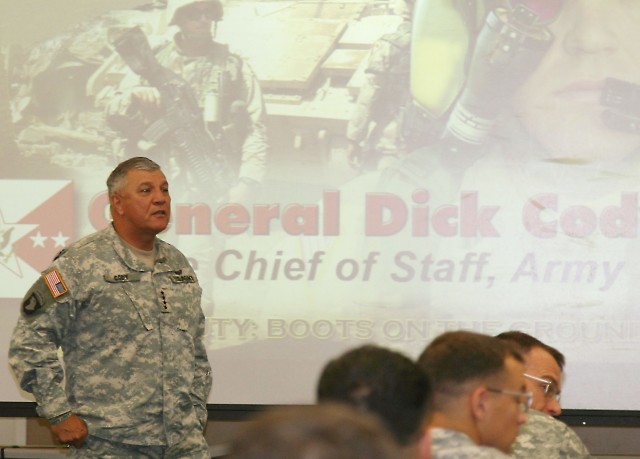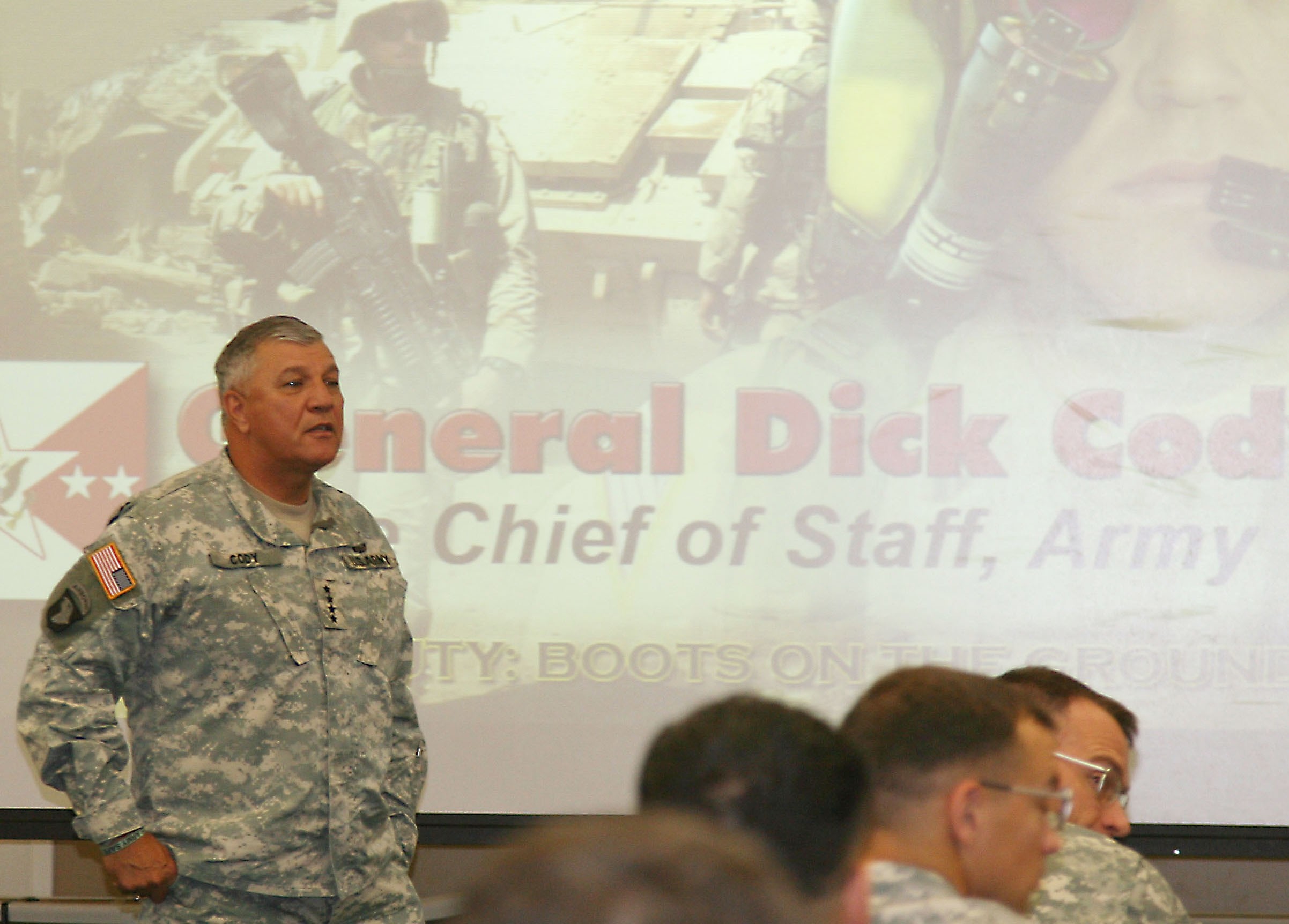Vice Chief of Staff of the Army Gen. Richard A. Cody interacted with Soldiers at Fort Rucker during a visit to the installation Sept. 19.
Invited to come by senior leaders here, Cody characterized his visit as great and said it inspired him as a leader.
"Under (Maj. Gen. Virgil L. Packett II, U.S. Army Aviation Warfighting Center and Fort Rucker commanding general's) leadership, Fort Rucker has taken the training of our aviation staffs and commanders in preparatory missions for Afghanistan and Iraq (to the next level)," Cody said.
Cody began his visit with breakfast with the five post Sgt. Audie Murphy inductees, 2006 Drill Sergeant of the Year, 2006 Soldier of the Year, Soldier of Third Quarter 2007 and NCO of Third Quarter 2007 at a post dining facility.
Following breakfast, Cody presented each Soldier with his coin.
Sgt. Audie Murphy Club inductee Staff Sgt. Ashley D. Baker, air traffic controller, Headquarters and Headquarters Company, 1st Battalion, 11th Aviation Regiment, said it's the first time during her Army career that she's met Cody.
Baker said Cody spoke about the concept of life cycle manning where Families will be more stabilized and remain at one duty station for four to seven years while their Soldiers may deploy but return to that installation.
"I found the information useful and it makes the Army more appealing knowing you and your Family will have stabilization in one place given the Global War on Terror," Baker said.
Sgt. Audie Murphy Club inductee Staff Sgt. Justin L. McGuire, facility chief, B Co., 1st Bn., 11th Avn. Regt., said Cody cares about his troops.
"(He makes) sure we're well taken care of and he's concerned for our quality of life and training," McGuire said.
Sgt. William Suclupe, 2006 Soldier of the Year and mental health specialist noncommissioned officer-in-charge at Lyster Army Health Clinic, portrayed Cody as straightforward.
"He does have a passion for the American Soldier and their service to their country," Suclupe said.
Cody also spent time at Lyster Army Health Clinic. Cody visited with clinic leaders about how they take care of wounded warriors and reenlisted three Soldiers during a brief ceremony there.
The Vice Chief of Staff of the Army also visited Soldiers in the Aviation Pre-Command Course at Adams Hall to talk to newly selected brigade and battalion commanders.
"I got to share some thoughts with them and have them talk to me about what big Army needs to do to assist them as they take on their roles as battalion commanders and brigade commanders," Cody said. "These commanders cut across the entire Army from active, guard and Reserves and all of them will be preparing their units for combat."
After speaking with the soon-to-be brigade and battalion commanders, Cody addressed roughly 150 captains from the Captains Career Course.
Cody spoke about the state of the Army and the $35,000 retention bonus virtually all regular active-duty Army Aviation captains in year groups 1999-2004 are now eligible to receive.
"We can't grow majors and lieutenant colonels (overnight)," Cody said. "In the next five years, as we grow the Army by 65,000, we're going to increase the requirements for the numbers of majors and lieutenant colonels (and) that means we need to start bringing in more lieutenants out of ROTC, West Point and (Officer Candidate School) but, (at) the same time, we need to retain a larger number of our captain population so that we (can) grow."
Cody then ate lunch with 15 captains from the Captains Career Course in the Cobra Lounge at Aviators' Landing.
"We have the best captains I've seen since I've worn this uniform," Cody said. "(They're) combat tested (and) these young men and women know how to take care of their people. They know how to fight. They know how to lead in stressful situations."
Cody said he also spoke to commanders and staff of the 101st Aviation Brigade who were at Fort Rucker participating in an aviation training exercise that is part of their train-up for a deployment to Afghanistan.
During a press conference, Cody recapped his visit to Fort Rucker and discussed what's happening in today's Army including what he sees as Fort Rucker's evolving role in Unmanned Aerial Systems.
"Fort Rucker is the proponency for the U.S. Army on Unmanned Aerial Systems," Cody said. "We have partnered Fort Rucker very closely with Fort Huachuca, Ariz. Fort Rucker has a proponency for contingency operations as well as tactics, techniques and procedures."
Cody also said the Army is using UAVs to do route reconnaissance for the ground forces rather than use OH-58 Kiowa Warrior and AH-64 Apache helicopters.


Social Sharing